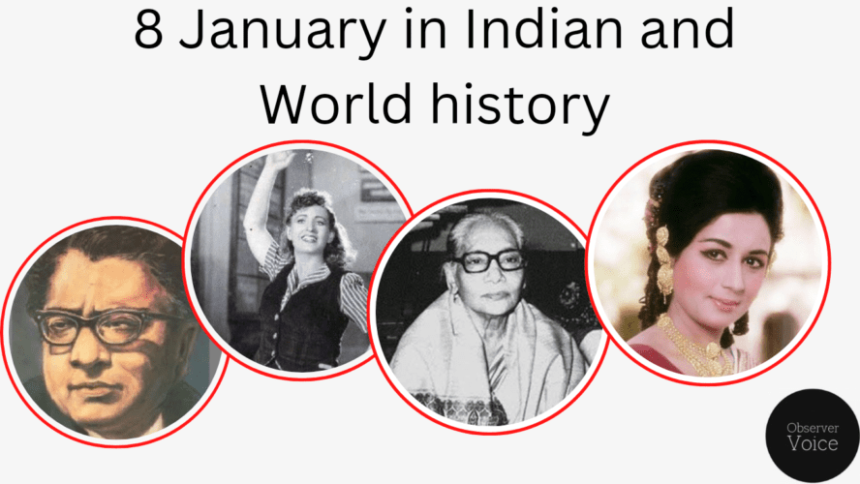8 January in Indian and World History is celebrated, observed, and remembered for various reasons. 8 January is the birth anniversary of Ramchandra Verma, Fearless Nadia, Ashapoorna Devi, Mohan Rakesh, and Nanda.
8 January is also observed as the death anniversary of Keshav Chandra Sen, and Bimal Roy.
Birth Anniversary
8 January in Indian history is celebrated as the birth anniversary of the following personalities:
Ramchandra Verma (8 January 1890 – 1969), done a great service to Hindi literature. He gave many of his important works to the Hindi world. In 1907, Ramchandra Varma worked in the Hindi version for Bal Gangadhar Tilak’s Marathi paper ‘Kesari’. He was born on 8 January 1890 in Kashi, Uttar Pradesh.
Fearless Nadia (8 January 1908 – 10 January 1996), one of the most famous actresses of Indian cinema. Not only in Hindi, in the history of cinema of any Indian language, but there also has never been another heroine of such a Dabang, fearless, brave, stuntbaaz, Tarzan, or Robinhood style. Nadia gave such a lively performance in the thirties and forties of Hindustani cinema as a daring and courageous actress that she demolished many beliefs of traditional Indian society. Nadia was a huge star in her time. She gave many hit films on his own but could not get the respect that she deserved. She was born on 8 January 1908.
Ashapoorna Devi (8 January 1909 – 13 July 1995), a noted Bengali novelist who started writing at the age of 13. She was born on 8 January 1909 in Calcutta.
Mohan Rakesh (8 January 1925 – 3 January 1972), a writer of the ‘Nai Kahani Movement’. The rise of Mohan Rakesh on the horizon of Hindi drama took place at a time when the tide of the cultural renaissance was pulsating in every walk of life in the country in the 1950s after independence. His plays not only changed the taste, tone, and level of drama but also influenced the direction of Hindi theatre. In the modern Hindi literary period, Mohan Rakesh, away from his writings, brought Hindi literature closer to the theater and made himself equal to Bharatendu Harishchandra and Jaishankar Prasad. He was born on 8 January 1925.
Nanda (8 January 1938 – 25 March 2014), a famous Indian film actress. She worked exclusively in Hindi and Marathi films. Nanda’s name is also taken among the famous actresses of her time. This actress of the 60s and 70s started her film journey as a child artist. She later became a successful heroine and then a character actress. With his sensitive acting, she brought to life his roles in many films. She was born on 8 January 1938.
Read More: 7 January in Indian and World History
Death Anniversary
8 January in Indian history is observed as the death anniversary of the following personalities:
Keshav Chandra Sen (19 November 1838 – 8 January 1884), a famous religious and social reformer, was one of ‘Brahma Samaj’s founders. was one of them. He was a very intelligent, logical, and learned young man. He enthusiastically started organizing the society and due to this, he was soon appointed to the post of Acharya. Keshav Chandra Sen had advised the founder of Arya Samaj Swami Dayanand Saraswati to compose ‘Satyarth Prakash’ in Hindi. The ideas of Keshav Chandra Sen and Swamiji did not meet each other, due to which the Brahmo Samaj was divided into ‘Adi Brahmo Samaj’ and ‘Bharatiya Brahmo Samaj. On his return from England, Keshav Chandra Sen formed an organization called the ‘Indian Reform Association’. Its membership assembly was open to people of caste and religion. The arrival of Keshav Babu became a curse for the organization and nature of Brahmo Samaj. Thoughts of Maharishi Devendranath and Keshavbabu did not meet, as a result, the Brahmo Samaj was divided. The original Brahmosamaj came to be known as ‘Adi Brahmo Samaj’ and the newly formed society of Keshavbabu became famous as ‘Bharatvarshi Brahmo Samaj’. He died on 8 January 1884.
Bimal Roy (12 July 1909 — 8 January 1966), an Indian film director. Among his best-known, realistic and socialistic films are Do Bigha Zamin (1953), Bandini (1963), Biraj Bahu (1954), and Madhumati (1958), which he used to portray realism. His career has been filled with awards, including eleven, and the International Prize at Cannes. Madhumati won 9 Filmfare Awards in 1958, a record he held for 37 years. He died on 8 January 1966.
Read More: 6 January in Indian and World History
Notable events on 8 January in Indian and World History
8 January 1697 – The last time the death penalty was given in Britain for a charge of blasphemy was.
8 January 1790 – America’s first President George Washington addressed the country for the first time.
8 January 1824 – Francisco González Bocanegra, a Mexican poet, was born.
8 January 1856 – Hydrated sodium borate was discovered by Dr. John Veitch.
8 January 1889 – Hermann Hollerith was granted a patent for the invention of the punch card tabulating the machine.
8 January 1908 – Fearless Nadia, an Australian-born actress and stuntwoman, was born.
8 January 1911 – Emma Ihrer, a German feminist, and trade unionist, died.
8 January 1921– Emma Gad, a Danish writer, and socialite, died.
8 January 1929 – The first telephone contact was established between the Netherlands and the West Indies.
8 January 1942 – Stephen Hawking, a renowned theoretical physicist, was born.
8 January 1952 – Jordan adopted the constitution.
8 January 1971 – President of Pakistan Zulfikar Ali Bhutto freed the leader Sheikh Mujibur Rahman from prison.
8 January 1973 – Russia’s space “Mission Luna 21” was launched.
8 January 2009 – Egyptian archaeologists discovered the mummy of Queen Sesheshet in a 4,300-year-old pyramid

